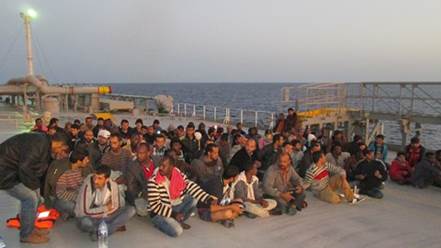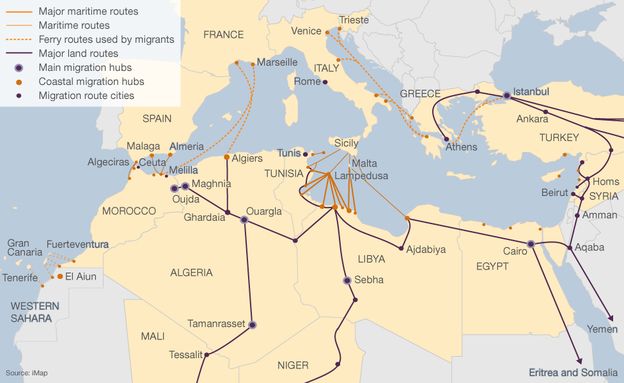Members will be aware of recent news reporting in respect of the continued movement of refugees and migrants across the Mediterranean Sea. As the weather improves in the region, it is expected that there will be another large movement in 2015, possibly exceeding that of 2014.

Rescued persons on board a vessel (Source: Skuld member)
The situation
In the year past an estimated 200,000 (and possible more) people sought to reach Europe by crossing the Mediterranean Sea. Typically this voyage is undertaken in small craft, heavily overloaded, and overall unsuitable for such a passage. Many are feared to have perished in the attempt. There were also attempts made with the use of larger commercial vessels sent on auto pilot towards Italy. Skuld vessels were involved in many rescues and are estimated to have taken on board several thousand people during 2014.
The reasons for this movement of people, unprecedented in Europe since World War II, are many, but can be traced back to conflicts and economic issues in large areas of Africa and the Middle East, particularly the situation in Syria and Libya have contributed to the present state of affairs. It is estimated that over the winter months several hundred thousand people have massed in Libya and are now preparing to make the passage to Europe as the weather improves.
According to the UN High Commission for Refugees, over 13,500 people were rescued in the period of 10 April to 17 April 2015, and 900 are feared to have perished this year (not including those who may have died over the weekend).
Over the weekend a further significant incident occurred, which may have resulted in several hundred deaths. Skuld vessels were among those asked by the authorities to assist in the Search and Rescue (SAR) operation.
At present the outlook is that for the rest of year there will be a continued movement of people across the Mediterranean.
Members with vessels trading in this area, or passing through it, will need to be prepared for the significant likelihood that they will come across such people or will be asked by regional or local authorities to assist in SAR operations.
Reminder: subject to primary concerns of the safety of the crew and vessel, masters need to be fully aware of their obligations under international convention and local laws to assist distressed persons at sea. A failure to render assistance may create legal, including criminal, liabilities.

Movement of people (Source: BBC)
Emergency response
If a vessel comes across distressed persons at sea, then it is an obligation with the force of law that assistance must be rendered (subject to the safety of the crew and vessel rendering the assistance).
There are many considerations to keep in mind when this situation arises, and masters should take the following steps amongst the other necessary measures to respond to the situation in a safe and responsible manner:
- identify the likely number of vessels and people being encountered
- urgently contact the nearest responsible maritime authority / coast guard of the situation
- assess how assistance can be safely rendered
- provide such assistance and rescue as can be safely provided
- call for additional help and support as may be required
- identify if any rescued persons are in need of urgent medical attention
- keep in constant contact with the maritime authority / coast guard responding to the incident
- inform concerned parties, including managers, charterers, as well as the club of the situation soonest
- keep a very careful photographic, video and written record of the entire event
- contact the Skuld correspondent in the country / port to which rescued persons are to be taken
Should a vessel encounter a situation that it cannot respond to, at least not without further assistance, or should an emergency arise, then the master should prioritise the safety of human life and make an urgent call for further help as he considers necessary.
If a vessel is contacted by a maritime authority or a coast guard to come to a SAR operation, then it should follow the instructions and adopt the above as appropriate in the light of developing circumstances.
Preparedness advice
It is now a significant likelihood that if vessels trade to / from ports in the Mediterranean, especially in the central area, or pass through this region, that they will encounter distressed persons at sea or be asked to assist in a SAR operation. While commercial vessels are not designed or intended to engage in large scale rescue operations at sea, the present facts are that this is a role which they are being asked to perform and to which they have to respond as best as they can in the circumstances.
Vessels should seek to prepare for this eventuality and that includes preparation with respect to training and briefing of crew, as well as having stores on board that can be used in the eventuality of such a situation.
It would be prudent for crews to be briefed on the situation in advance of entering the Mediterranean and for procedures to be discussed and implemented for the eventuality that this type of situation will be encountered. Crew that have been pre-advised and briefed are likely to respond more effectively and as such are likely to be able to do so in a more effective and safe manner.
Having on board stores of bottled water, first aid kits, ready food and blankets may also assist when the time comes to respond. While this means increased cost when supplying the vessel, the present situation would counsel that such is prudent preparation for a significant likelihood of having to meet the demands of an emergency response in this part of the world.
It would also be prudent to consider addressing this situation in advance when agreeing to charterparties that would see the vessel be in the areas where the is an increased chance of having to respond to distressed persons at sea. That includes addressing the possible cost and time issues that may follow should a vessel actually have to engage in a SAR operation.
Skuld and other resources
Skuld has advised throughout 2014 on this situation, and provided access to further resources and materials which members will find helpful when engaging in risk management and preparedness operations, as well as guidance for dealing with a real life situation.
For vessel specific enquiries, members are asked to contact their usual Skuld business unit.
